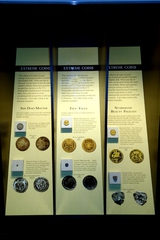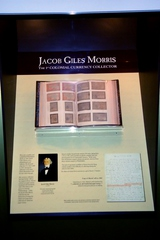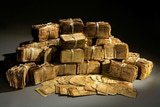
PREV ARTICLE
NEXT ARTICLE
FULL ISSUE
PREV FULL ISSUE
A VISIT TO COLONIAL WILLIAMSBURG'S NUMISMATIC EXHIBITS
About.com Coin Guide James Bucki recently vacationed in Colonial Williamsburg and wrote a piece about the fabulous exhibits of colonial era coins, medals and paper money housed at the DeWitt Wallace Decorative Arts Museum, where he spoke with curator Erik Goldstein.
-Editor


Housed in the DeWitt Wallace Decorative Arts Museum in Colonial Williamsburg are numismatic gems in the world of colonial coinage, medals and currency. The exhibit "Dollars, Farthings & Fables" brings to life the currency and coins that were driving a young nation. These tangible assets from a distant past are displayed in a style that is both interesting and enlightening to all visitors of the museum. Since he was a boy, Curator Mr. Erik Goldstein was obsessed with the American Revolution while simultaneously being a coin collector. Therefore, it was only natural that he began to study colonial currency and early American coinage. He prefers "coins with history" over pristine examples that have never had a life outside of a museum's coin cabinet. One of his favorite examples of this principle is a Virginia halfpenny that was unearthed on the grounds of the Governor's Palace at Williamsburg. By no means is it an unspoiled specimen, but if it could talk it would have a story to tell that would keep us spellbound for hours. "Dollars, Farthings & Fables" The Cornell Paper Money Hoard The Jacob Giles Morris Collection
To read the complete articles, see:
The Numismatic Bibliomania Society is a non-profit organization promoting numismatic literature. See our web site at coinbooks.org. To submit items for publication in The E-Sylum, write to the Editor at this address: whomren@gmail.com To subscribe go to: https://my.binhost.com/lists/listinfo/esylum All Rights Reserved. NBS Home Page Contact the NBS webmaster 
|
